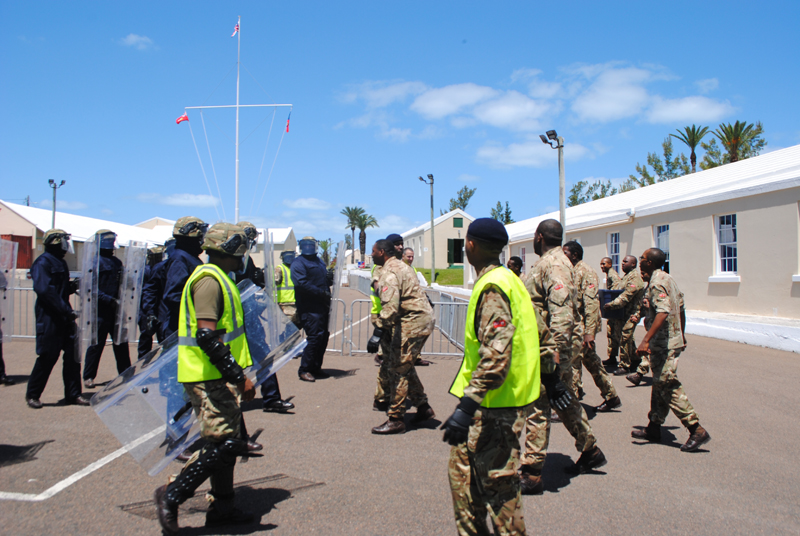Regiment Start One Week On-Island Camp
About 100 soldiers from the Royal Bermuda Regiment have started a one week on-island camp.
The troops – from infantry soldiers from A Company, to signallers and bandsmen – will train at Warwick Camp this week instead of the traditional overseas exercise.
The soldiers from A Company practiced public order work with the Operational Support Unit [OSU], while bandsmen tuned up for their summer schedule of performances and signallers worked on communications in the field.
Troops tasked to test the efficiency of public order units take a break at Warwick Camp
Colour Sergeant Shaun Williams helped train the A Company troops.
He said: “We’re teaching them basic public order at police level just to get them competent with police public order drills so if Bermuda was ever to experience public disorder, they would be capable of not only being reserves for the police but fit in well.”
The troops practised their drills on the parade ground at Warwick Camp with fellow soldiers acting as a hostile crowd.
Colour Sergeant Williams said: “This is the first time in a long time they trained with a ‘civilian population’ so they have learned a lot of lessons and used a lot of different tactics.”
He added: “They’re doing well and they’re taking on what they’ve been taught. It’s an addition to the training they would normally get and they’re enjoying it.”
Private Kleche Burgess, 26, from Devonshire, a security officer in civilian life and a former member of the OSU, said: “We’re able to do the job. We listened and we did everything properly.”
Sergeant Peter-Paul Taylor, a platoon sergeant in the OSU, said: “We’ve had police training before. We’re continuing that and A Company is now learning what we learned. They’ve performed well and I’m proud of them.”
Major Ben Beasley, the RBR’s Training Officer, added: “One of the important roles we have is offering support to police in non-routine operations. What underlines our capability is making sure there is minimal use of force – if a situation requires it at all.”
The RBR this year decided to cancel the normal two week overseas exercise to help pay for a full-time Boat Troop, which has a new headquarters and will take over from the marine police in maritime security work.
Colour Sergeant Andy Chappell, from the British Army’s Mission Training and Mobilisation Centre, is one of the overseas experts brought in to assist with training.
Colour Sergeant Chappell, of the Royal Regiment of Fusiliers, taught soldiers the rules of engagement and the use of lawful force.
He said the RBR compared well with similar Army Reserve battalions in Britain.
Colour Sergeant Chappell said: “The RBR is more of a bridge between reserve forces and full-time. I find they are better resourced and they have a lot more of a feel of a regular battalion.”
Major Corey Smalley, the RBR’s Executive Officer, said only the Junior Non-Commissioned Officer’s Cadre travelled to the United States Marine Corps Camp Lejeune in North Carolina for overseas training this year.
He added another one week camp would be held later in the year to complete the required two week training period.
Major Smalley said: “We will be part of a week-long joint services exercise which will test service interoperability.”
He explained that overseas training in the future would involve smaller groups of soldiers taking specialist courses.
Major Smalley said: “For example, we’re sending two soldiers from Boat Troop to the Cayman Islands this weekend. The Royal Navy has an expeditionary training team delivering training to the Overseas Territories in Grand Cayman.”
He said the two would qualify as small boat coxswains and also learn navigation and engineering skills.
Major Smalley said: “That’s very much in line with what we want to achieve in the next five years – the education and development of our soldiers. Investing in our soldiers is priority number one.”
He added the British Ministry of Defence had paid all the expenses for the two Boat Troop soldiers in the Caymans and the Royal Navy training.
Major Smalley said: “Bermuda being an island, this is an incredible life skill to have. Being able to pilot a boat, work on the engines and navigate is very transferrable to civilian life.”






Well this surely is a watered down affair compared from decades ago when I was in the regiment for this same training.